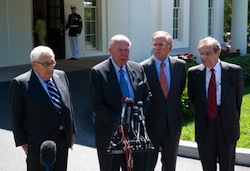Four Statesmen Urge Dual Track Strategy to Reduce Nuclear Dangers
January 20, 2010
Featured Image
We are happy to serve you a daily summary of the day's top nuclear policy stories each morning, with excerpts from the stories in bullet form.
Stories we're following today:
How to Protect our Nuclear Deterrent - George Shultz, William Perry, Henry Kissinger and Sam Nunn in the Wall Street Journal [link]
- The four of us have come together, now joined by many others, to support a global effort to reduce reliance on nuclear weapons, to prevent their spread into potentially dangerous hands, and ultimately to end them as a threat to the world. We do so in recognition of a clear and threatening development.
- The accelerating spread of nuclear weapons, nuclear know-how, and nuclear material has brought us to a tipping point. We face a very real possibility that the deadliest weapons ever invented could fall into dangerous hands.
- But as we work to reduce nuclear weaponry and to realize the vision of a world without nuclear weapons, we recognize the necessity to maintain the safety, security and reliability of our own weapons. They need to be safe so they do not detonate unintentionally; secure so they cannot be used by an unauthorized party; and reliable so they can continue to provide the deterrent we need so long as other countries have these weapons.
Jones, Mullen to Moscow for START Talks - Laura Rozen in Politico [link]
- National Security Advisor Jim Jones and Chairman of the Joint Chiefs of Staff Adm. Mike Mullen are due to go to to Moscow to resume negotiations over closing a START successor treaty at the end of the week, diplomatic sources said today.
GAO Delivers Nuclear Wake-Up Call to DOE - Nick Roth in Nukes of Hazard [link]
- For the last twenty years, the Department of Energy’s (DOE) “contract and project management” program has been a charter member of the Government Accountability Office’s (GAO) list of government programs at high risk for fraud, waste, abuse, and mismanagement.
- Late last week GAO ensured that the contract and project management program would remain on the list when it released a report describing how incredibly poor DOE has been at estimating the cost of their programs.
- GAO is to be commended for highlighting DOE's slipshod accounting practices. GAO should also conduct a study of what accountability measures can be put in place when DOE programs go way over budget. One model to consider is how the Department of Defense (DOD) deals with significant cost overruns in their weapons procurement process.
U.S. Spy Agencies See Iran Push Atom Bomb Research - New York Times [link]
- Analysts from across the U.S. intelligence community have been finalizing a revised national intelligence estimate (NIE) that is expected to bring the United States more into line with its European allies about the state of Iran's nuclear program.
- "Basically, we're talking about research (resuming) -- not about the Iranians barreling full steam ahead on a bomb program," a U.S. official said on condition of anonymity.
- "When you're looking at the Iranian nuclear program, nuance matters," the official added.
- The revised findings could help Washington make the case within the U.N. Security Council for a new round of sanctions against Tehran, which has rejected key parts of a deal to send abroad for processing most of its material that could be used to make nuclear arms.
The Obameter: Nuclear Promises - St. Petersburg Times [link]




